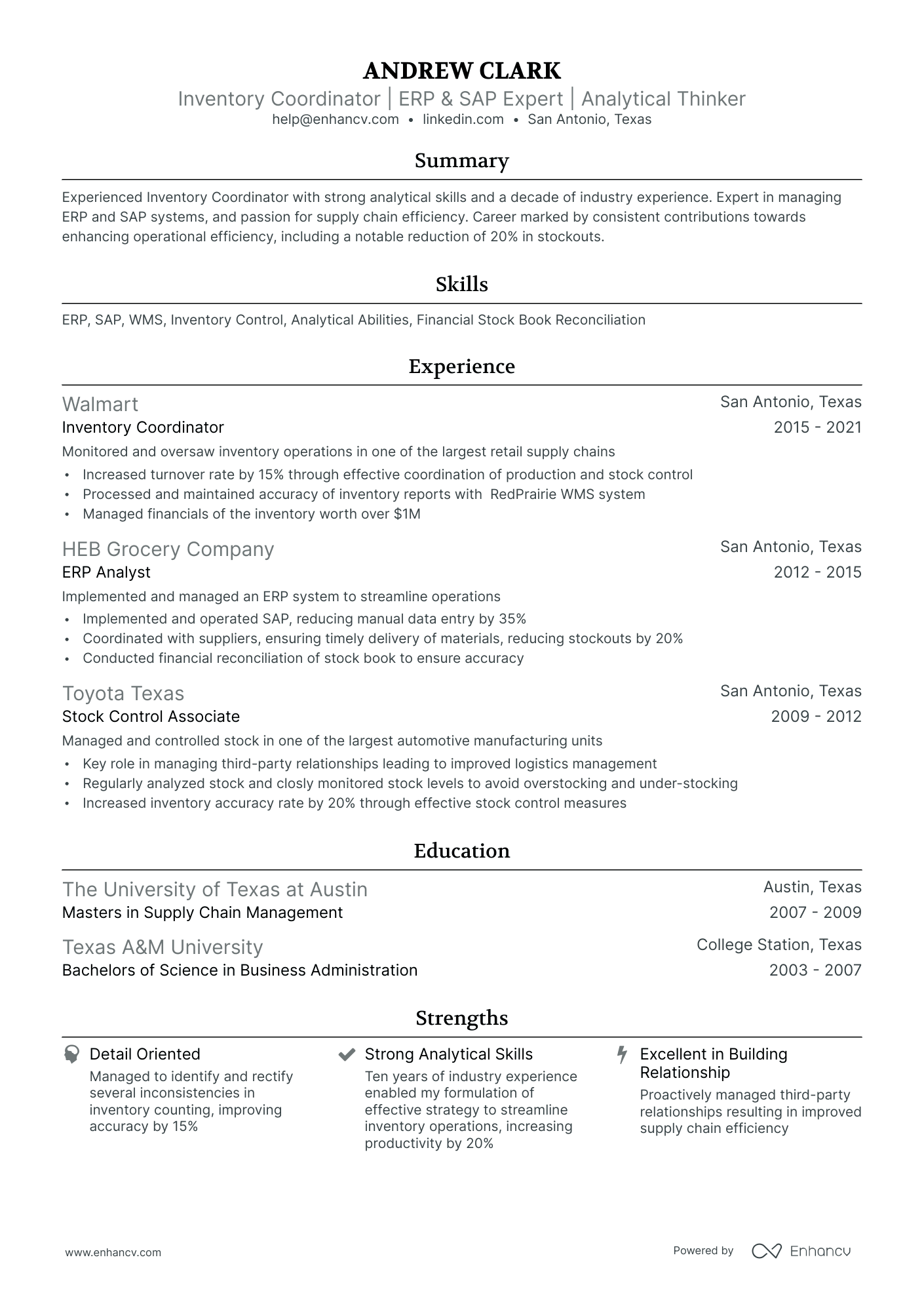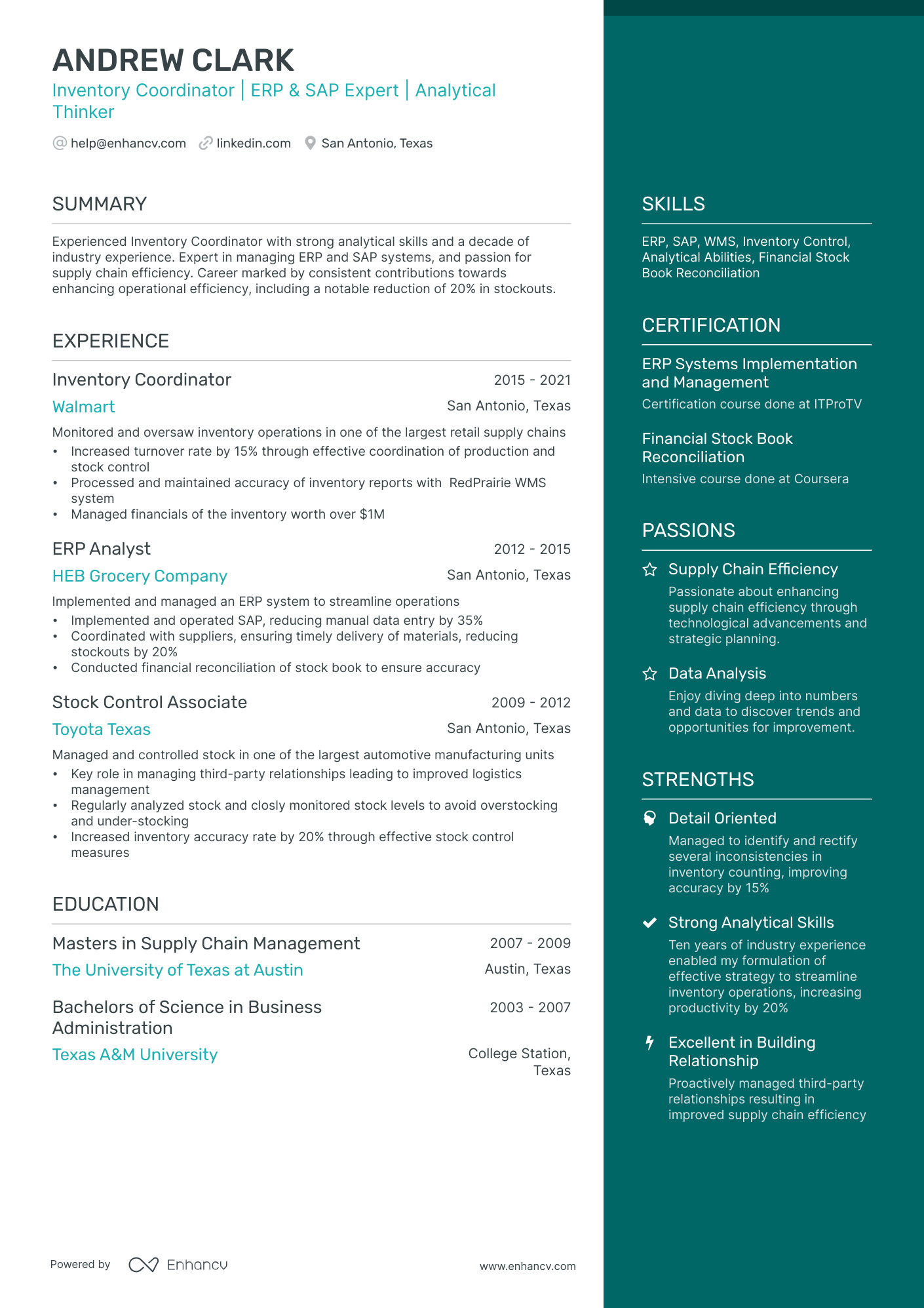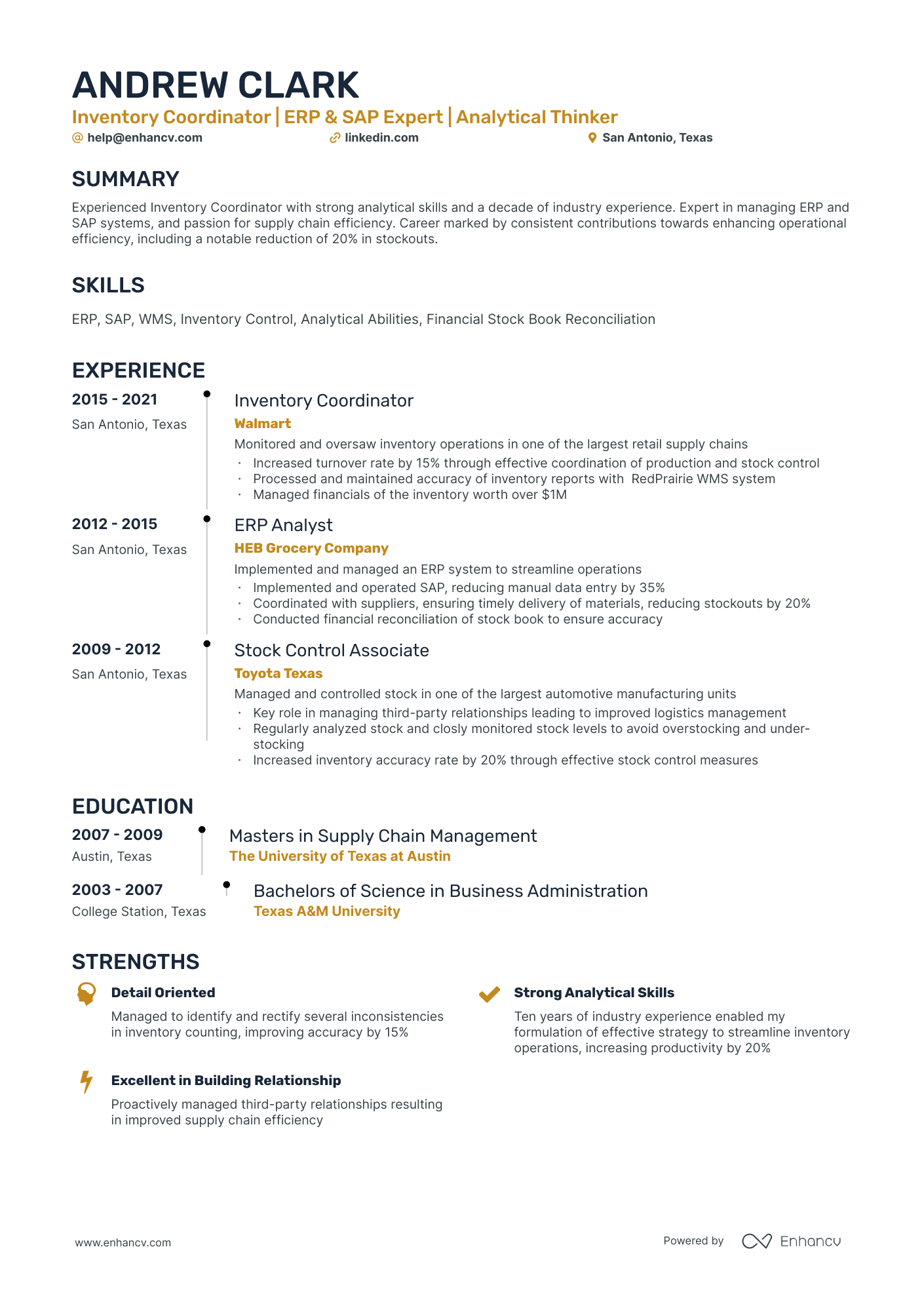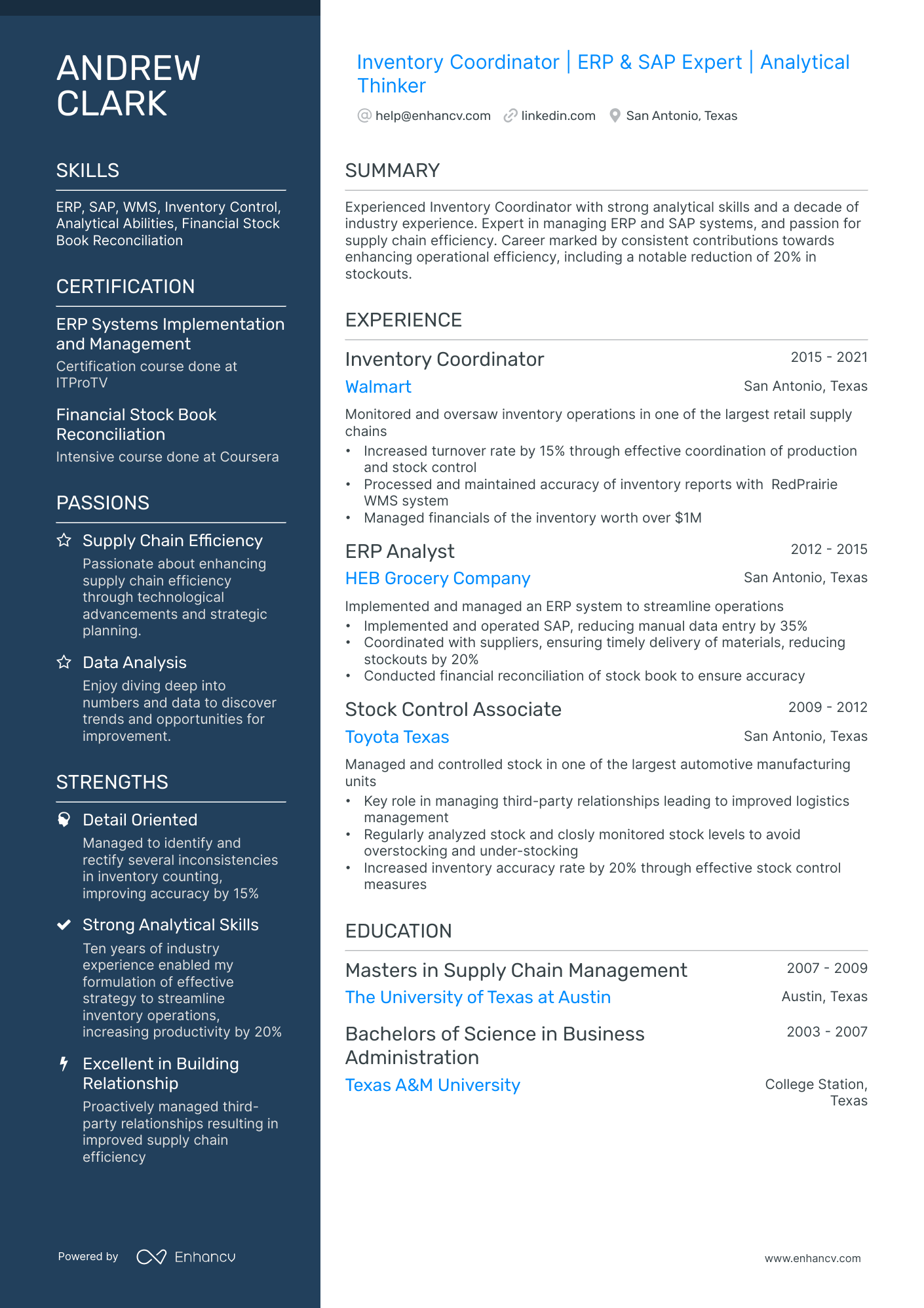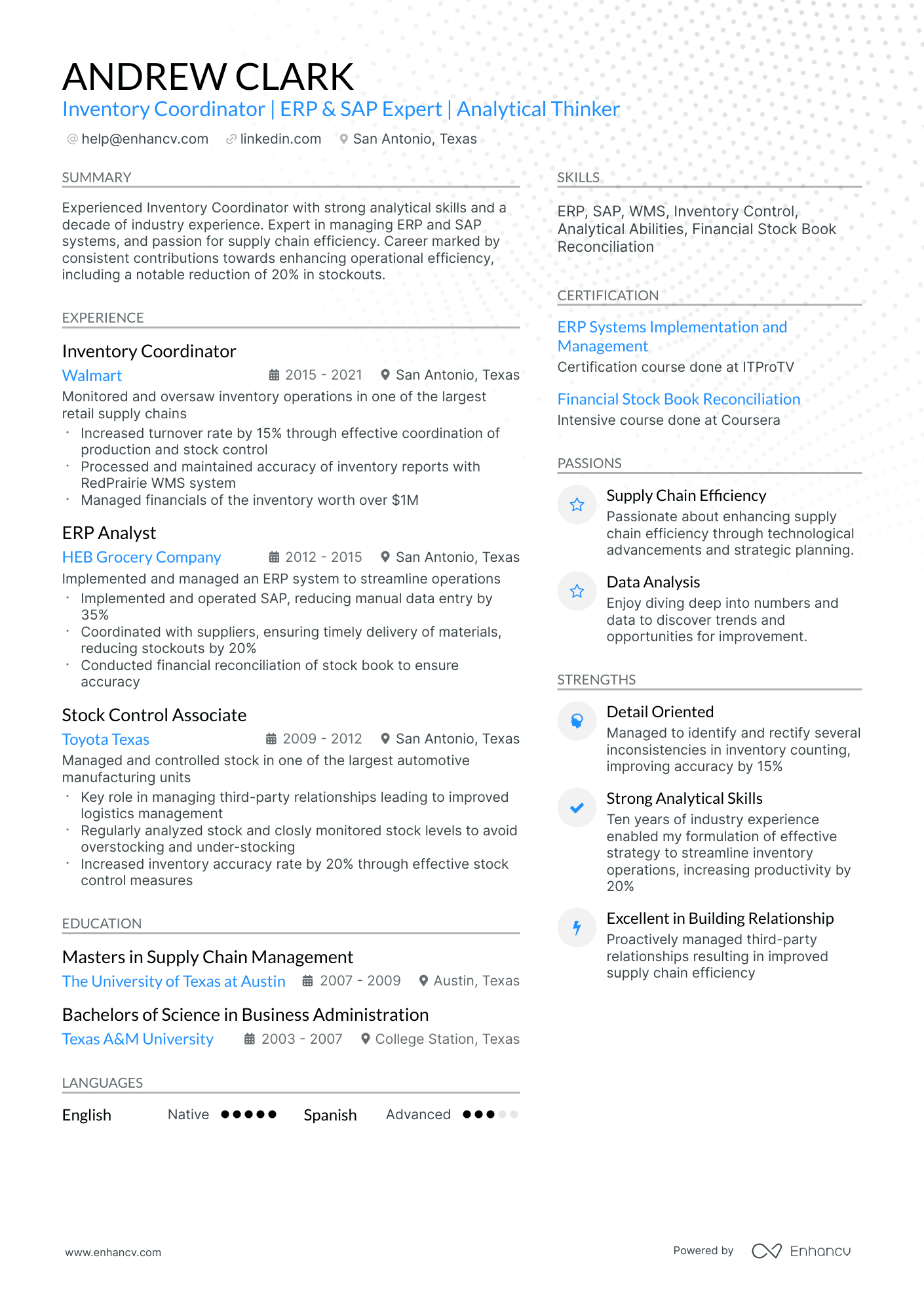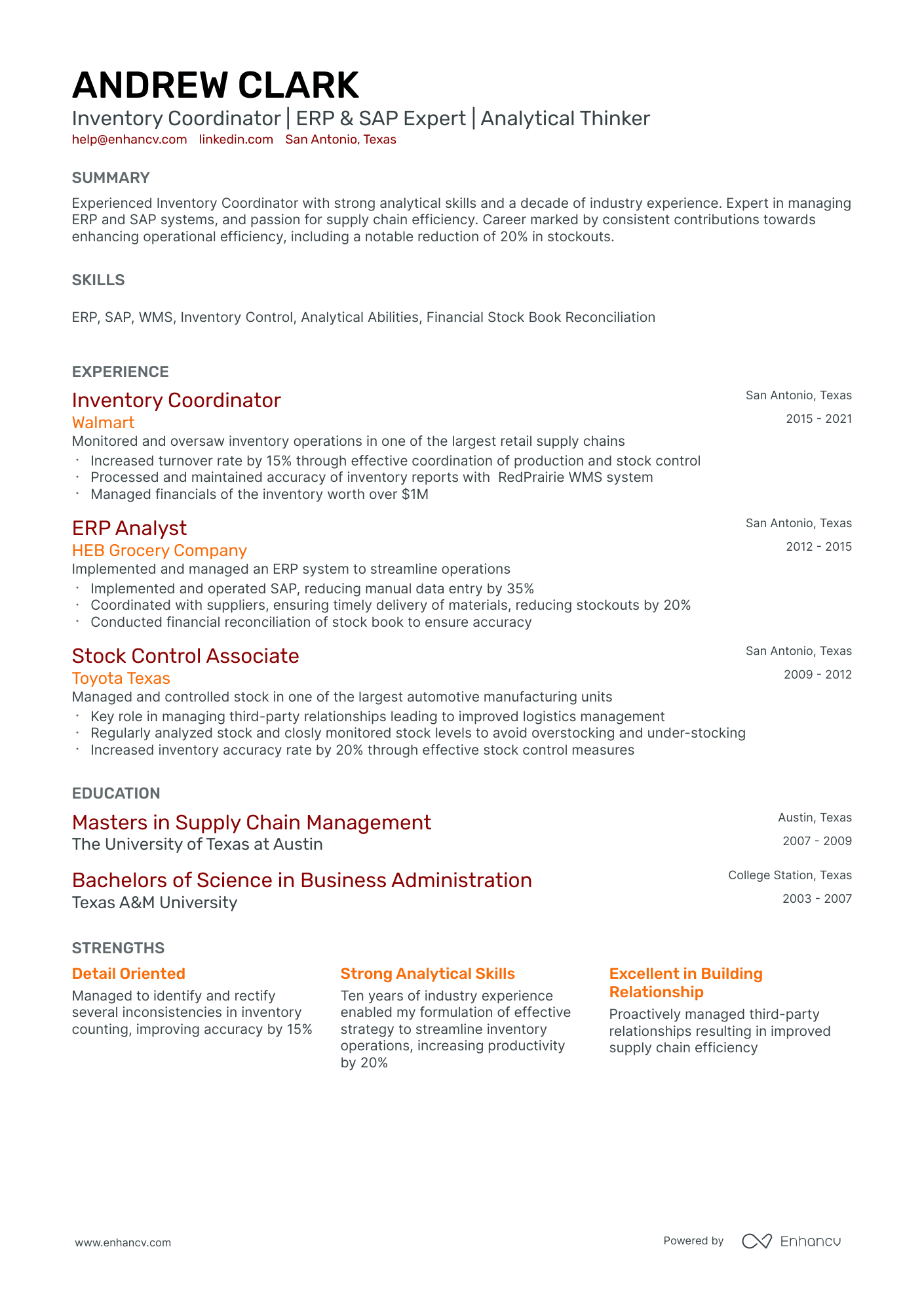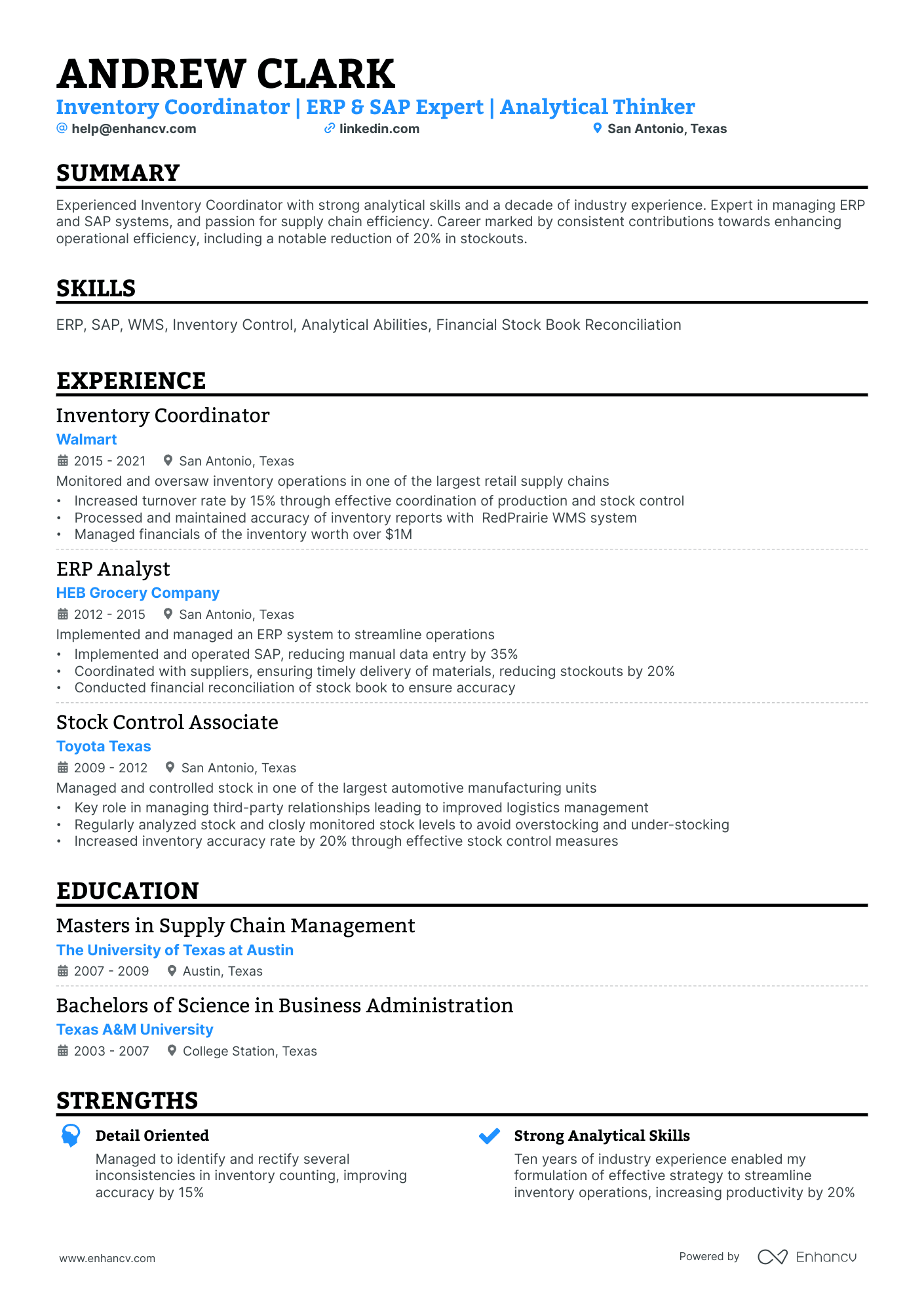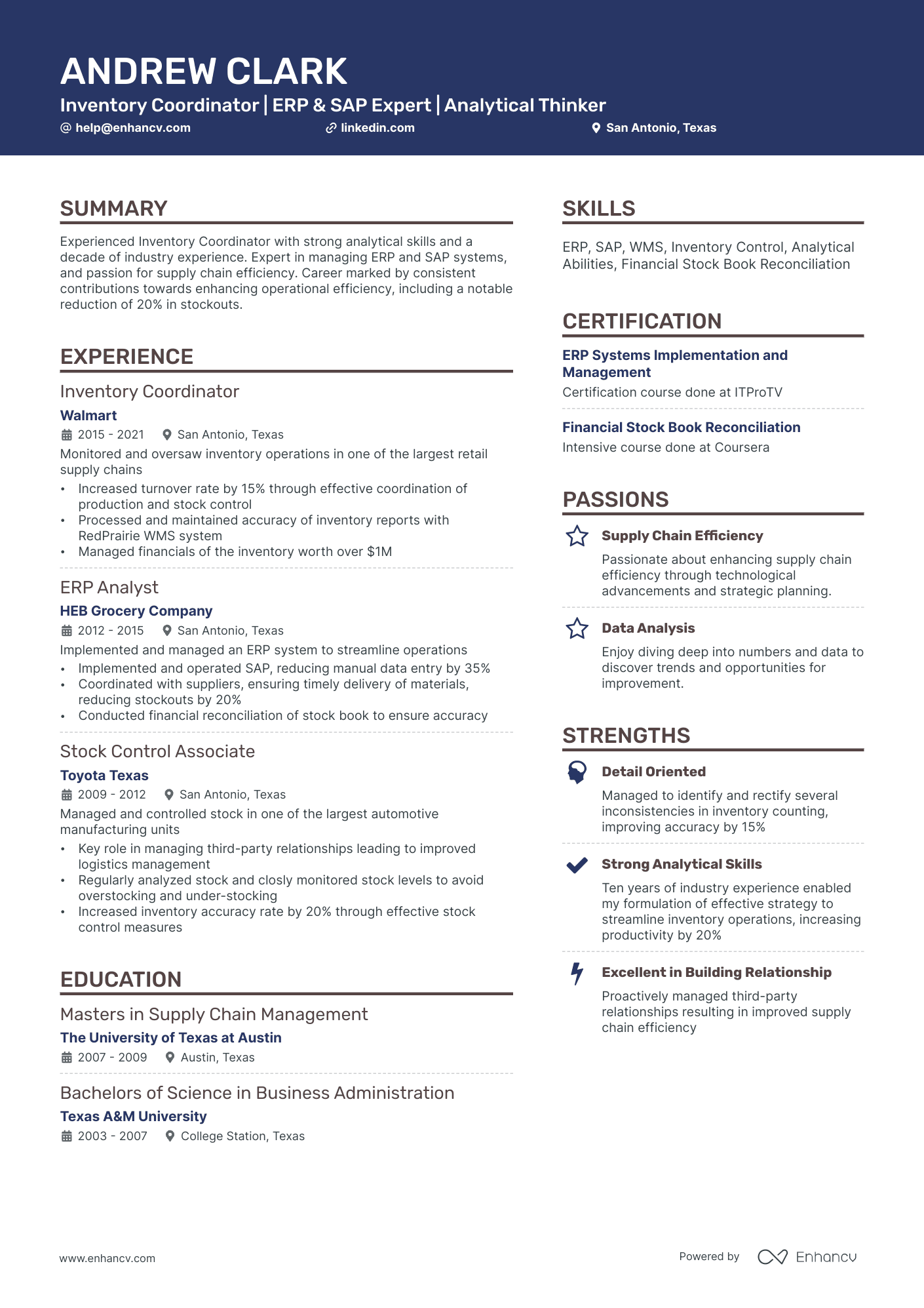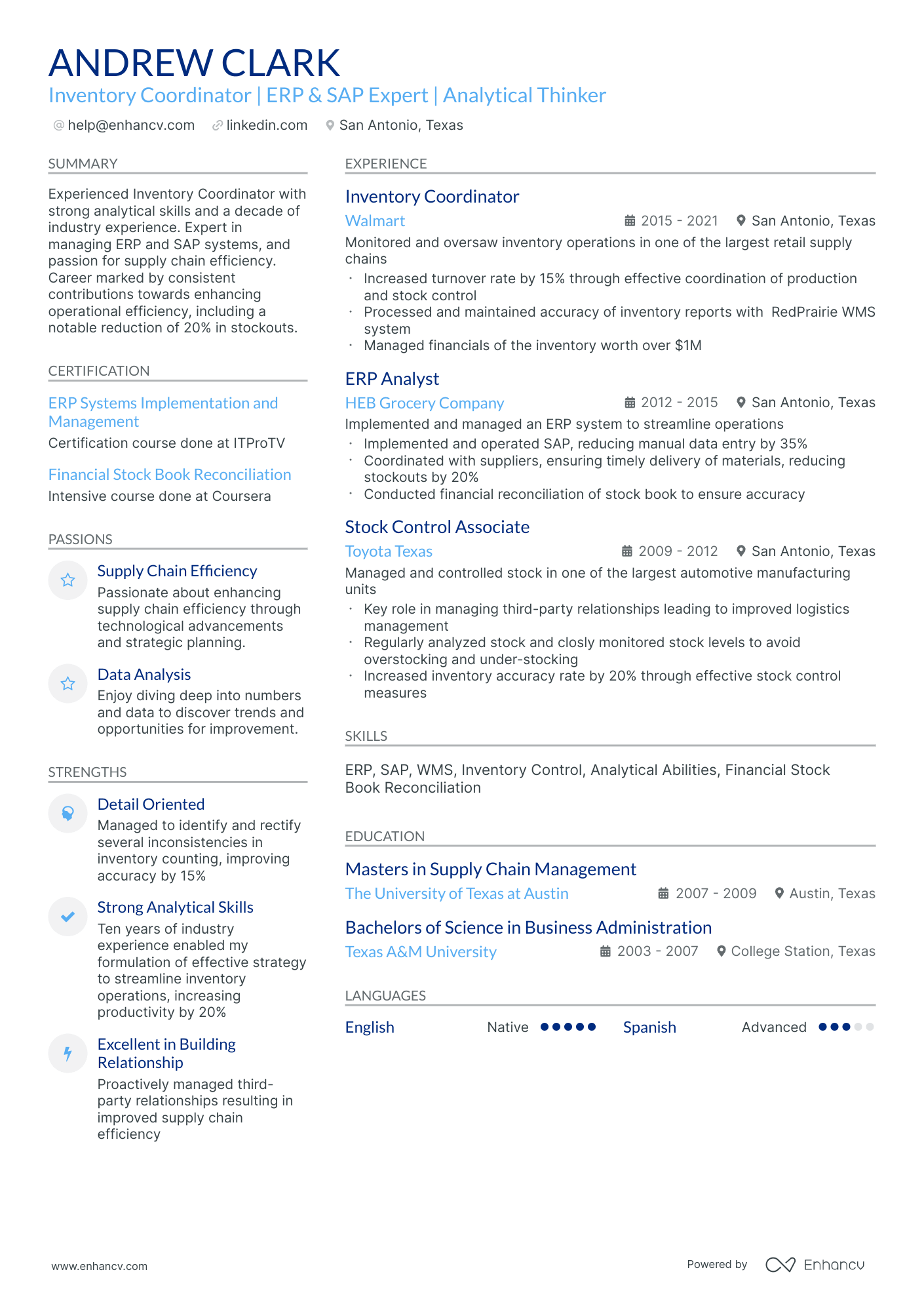Inventory coordinators often struggle to effectively articulate the scope of their responsibilities and achievements in a concise yet impactful manner on their resume. Our guide can assist by providing targeted tips and examples on how to quantify accomplishments, prioritize relevant skills, and use action verbs to accurately depict your role as an inventory coordinator.
Our inventory coordinator guide will help you perfect your resume by explaining you how to:
- Alight your inventory coordinator resume with the role you're applying for ensuring it will be read by the applicant tracking system.
- Tailor your specific inventory coordinator experience to get the attention of recruiters.
- List your relevant education to impress hiring managers.
- Discover job-winning inventory coordinator professional resume examples to inspire writing yours.
Recommended reads:
crafting an impeccable inventory coordinator resume format in four steps
Your inventory coordinator resume format should be both strategic and reader-friendly. Here's a concise guide to help you achieve that:
- Choose a format that aligns with the job's requirements. If your expertise is directly relevant, the reverse-chronological format is ideal. If you're focusing more on skills, consider the functional or hybrid formats.
- Header: Ensure it's populated with accurate contact details and any relevant portfolio links.
- Length: A one-page resume is standard, but if you have extensive experience, extending to two pages is acceptable.
- File type: To maintain formatting consistency, always opt for PDF.
Think about the market’s preferences – a Canadian resume, for instance, could have a different layout.
Upload your resume
Drop your resume here or choose a file. PDF & DOCX only. Max 2MB file size.
Pro tip
Keep your inventory coordinator resume clear and concise. Top professionals narrate their career stories while highlighting their strengths.
Elevate your human resources coordinator resume with these essential sections:
- Header: The go-to section for recruiters seeking your contact details, portfolio, or current role.
- Summary or objective: A snapshot of your achievements and aspirations.
- Experience: A testament to your technical and interpersonal prowess.
- Skills: A showcase of your capabilities aligned with the job requirements.
- Certifications/Education: A reflection of your commitment to staying updated in the industry.
What recruiters want to see on your resume:
- Inventory Management Expertise: Proven experience in managing and coordinating inventory, including keeping accurate records of incoming and outgoing items.
- Data Analysis Skills: The ability to utilize inventory management software for forecasting and analyzing inventory levels and needs.
- Detail-Oriented: Meticulous attention to detail to ensure accuracy of inventory data and prevent discrepancies.
- Communication Skills: Capacity to effectively communicate with various stakeholders (e.g., suppliers, logistics companies, internal teams) to ensure smooth operations.
- Problem-Solving Abilities: Demonstrated ability to identify, analyze, and resolve problems related to inventory control efficiently.
Recommended reads:
The experience section of your inventory coordinator resume: your professional journey
The experience section is your platform to narrate your professional story. Recruiters scrutinize this section to gauge your unique value proposition.
Here are five steps to craft a compelling experience section:
- Highlight relevant roles, including the company, role description, and tenure, supported by up to six bullet points per role.
- Emphasize tangible outcomes of your contributions, using quantifiable metrics where possible.
- Integrate positive feedback or endorsements to bolster your claims.
- Ensure verb tense consistency when detailing responsibilities.
- Summarize significant achievements relevant to each role.
Explore how seasoned inventory coordinator professionals have crafted their experience sections to secure roles at industry-leading firms.
- Managed inventory levels for a high-volume retail chain, resulting in a 20% reduction in stockouts.
- Implemented an automated tracking system, increasing inventory accuracy by 15%.
- Collaborated with vendors to optimize supply chain processes, reducing lead time by 25%.
- Conducted regular audits to identify discrepancies and implemented corrective actions.
- Participated in cross-functional teams to develop strategies for inventory optimization.
- Coordinated shipments and managed warehouse operations, ensuring timely delivery of goods.
- Developed and maintained vendor relationships, negotiating favorable pricing terms resulting in cost savings of $50,000 annually.
- Implemented a barcode scanning system, reducing data entry errors by 30%.
- Created comprehensive inventory reports to track stock movement and forecast demand.
- Trained and supervised a team of inventory clerks, ensuring accurate record-keeping and efficient workflow.
- Managed inventory replenishment for multiple product lines, maintaining optimal stock levels.
- Implemented a demand forecasting model, resulting in a 15% reduction in excess inventory.
- Collaborated with sales and marketing teams to develop promotions based on inventory analysis.
- Conducted regular physical counts and cycle audits to ensure inventory accuracy.
- Led a project to optimize warehouse layout, improving picking efficiency by 20%.
- Ongoing: Coordinate inventory control activities for a fast-paced e-commerce company.
- Developed and implemented standard operating procedures for inventory management.
- Utilized data analysis tools to identify trends and optimize inventory turnover rate.
- Led a cross-functional team in implementing a new inventory management software.
- Collaborated with logistics partners to streamline inbound and outbound shipments.
- Managed inventory accuracy through regular cycle counts and reconciliation processes.
- Implemented a barcode scanning system to improve order fulfillment accuracy by 25%.
- Coordinated with the production team to ensure timely availability of raw materials.
- Optimized warehouse space utilization, reducing storage costs by 15%.
- Provided inventory reports to facilitate decision-making and maintain optimal stock levels.
- Streamlined inventory tracking processes, resulting in a 30% reduction in data entry time.
- Managed stock replenishment to meet projected sales demand and minimize stockouts.
- Conducted regular audits to identify discrepancies and implemented corrective measures.
- Collaborated with cross-functional teams to develop and execute inventory reduction strategies.
- Implemented a vendor management system, improving communication and reducing lead time.
- Oversaw inventory control processes and implemented measures to reduce shrinkage by 20%.
- Managed stock rotation to minimize obsolescence and improve inventory turnover ratio.
- Led a team in conducting physical inventory counts and reconciling discrepancies.
- Collaborated with procurement to optimize reorder points and maintain optimal stock levels.
- Developed training materials and conducted sessions to educate employees on inventory best practices.
- Implemented an automated demand forecasting system, improving accuracy by 25%.
- Coordinated with suppliers to ensure timely delivery of raw materials, preventing production delays.
- Developed and maintained inventory reports for senior management to support decision-making.
- Implemented product identification codes, enhancing traceability throughout the supply chain.
- Led a team in developing and implementing process improvements for inventory management.
- Managed inventory levels for multiple retail locations, ensuring optimal stock availability.
- Coordinated with store managers to analyze sales data and adjust replenishment strategies.
- Conducted regular audits to identify and resolve inventory discrepancies.
- Collaborated with the purchasing team to negotiate favorable pricing and terms with vendors.
- Led a project to implement an RFID-based tracking system, improving inventory visibility.
- Ongoing: Managed inventory control operations for a large-scale distribution center.
- Implemented process improvements to reduce order processing time by 20%.
- Collaborated with suppliers to ensure on-time delivery of materials and optimize stock levels.
- Analyzed historical data to forecast demand and adjust inventory levels accordingly.
- Led a team in conducting periodic inventory counts and reconciling discrepancies.
The following content includes information from "O*NET OnLine" by the U.S. Department of Labor, Employment and Training Administration (USDOL/ETA). Used under the CC BY 4.0 license. The data represents the top responsibilities present on the task lists for inventory coordinator professionals.
Top Responsibilities for Inventory Coordinator:
- Distribute production schedules or work orders to departments.
- Revise production schedules when required due to design changes, labor or material shortages, backlogs, or other interruptions, collaborating with management, marketing, sales, production, or engineering.
- Review documents, such as production schedules, work orders, or staffing tables, to determine personnel or materials requirements or material priorities.
- Arrange for delivery, assembly, or distribution of supplies or parts to expedite flow of materials and meet production schedules.
- Confer with establishment personnel, vendors, or customers to coordinate production or shipping activities and to resolve complaints or eliminate delays.
- Requisition and maintain inventories of materials or supplies necessary to meet production demands.
- Confer with department supervisors or other personnel to assess progress and discuss needed changes.
- Plan production commitments or timetables for business units, specific programs, or jobs, using sales forecasts.
- Compile information, such as production rates and progress, materials inventories, materials used, or customer information, so that status reports can be completed.
- Examine documents, materials, or products and monitor work processes to assess completeness, accuracy, and conformance to standards and specifications.
Quantifying impact on your resume
<ul>
Lacking experience? Here's what to do.
Candidates with limited experience often fall into two categories:
- Recent graduates aiming for a inventory coordinator role
- Professionals transitioning from a different field
Both can still land a job in the industry. Here's how to optimize the experience section of your inventory coordinator resume:
- Highlight your strengths, especially if they align with the job requirements.
- Remove unrelated experiences. Your resume should tell a story that resonates with the inventory coordinator role.
- Showcase your personality. Traits like ambition and diligence can make you an attractive candidate.
- Align your experience with the job requirements, ensuring your resume speaks directly to the role.
Recommended reads:
Pro tip
Highlight what sets your experience apart. Incorporate metrics, feedback, and the tangible value you've added to organizations. This specificity ensures your resume remains pertinent and memorable.
Essential inventory coordinator resume skills
When recruiters review inventory coordinator resumes, they're looking for a mix of technical know-how and personal attributes.
Technical skills demonstrate your proficiency in specific tools or tasks. They indicate if you're ready to jump into the role or if you'll need extensive training.
On the other hand, soft skills reflect your interpersonal abilities. They show how you'll fit into a team or company culture.
To effectively present these skills on your resume:
- Design a skills section that highlights both your technical and interpersonal strengths.
- Provide examples where you've applied these skills, such as projects or tasks.
- For soft skills, describe situations where they've been crucial to your success.
- Use metrics, like improved efficiency or positive feedback, to validate your skills.
For inspiration, explore the preferred skills of leading inventory coordinator professionals.
Top skills for your inventory coordinator resume:
Inventory Management Software
Barcode Scanning Technology
Microsoft Excel
SAP ERP
Oracle Inventory Management
RFID Technology
Data Analysis Tools
Forecasting Software
Database Management Systems
Supply Chain Management Tools
Attention to Detail
Communication Skills
Problem-Solving
Time Management
Organizational Skills
Team Collaboration
Adaptability
Critical Thinking
Customer Service Orientation
Multitasking
Next, you will find information on the top technologies for inventory coordinator professonals from "O*NET OnLine" by the U.S. Department of Labor, Employment and Training Administration (USDOL/ETA). Used under the CC BY 4.0 license.
Top technologies for Inventory Coordinator’s resume:
- Microsoft Dynamics
- Oracle PeopleSoft
- Airtable
- Oracle Database
- Bill of lading software
- Waterloo Hydrogeologic TACTIC
Pro tip
Sometimes, basic skills mentioned in the job ad can be important. Include them in your resume, but don't give them too much space.
how to properly list your resume's education and certifications
Don't underestimate the importance of your resume education section , as it oftentimes helps you further tailor your resume to the job ad.
When writing your education section:
- Include the most relevant degree you have with information about the institution and dates of start and completion;
- If you're in the process of obtaining your degree, include your expected graduation date;
- Consider leaving off degrees that aren't relevant to the job or industry;
- Add bullet points to show how you gained valuable experience relevant for the job in an academic environment.
When describing your resume certifications , always consider their relevancy to the role.
Use the same format to describe them as you will for your education. If you're wondering what are the best certificates for inventory coordinator roles, check out the list below.
Best certifications to list on your resume
Pro tip
If a particular certification is highly valued in the industry or by the company, consider highlighting it in your resume's headline.
Recommended reads:
Summary or objective: maximizing the impact of the top third of your resume
The top third of your inventory coordinator resume is crucial. It's often the first thing recruiters see and can set the tone for the rest of your application.
Whether you choose a resume summary or a resume objective, make it count. The former is great for showcasing career highlights, while the latter balances your achievements with your future aspirations.
Both should be tailored to the role, as there's no universal approach to crafting the perfect inventory coordinator summary or objective. Use the examples below as a starting point.
Resume summary and objective examples for a inventory coordinator resume
Optimize your resume summary and objective for ATS
Drop your resume here or choose a file.
PDF & DOCX only. Max 2MB file size.
Extra sections to boost your inventory coordinator resume
Add more sections to show off your unique skills and personality.
- Projects - Include any impressive ones you've done outside of work.
- Awards - Show off any industry recognition.
- Volunteering - Share causes you care about and skills you've gained.
- Personality - Hobbies or favorite books can give a glimpse into who you are.
Key takeaways
- A clear resume layout helps present your info well.
- Use all main resume sections to show how you fit the job.
- Detail specific skills or tasks and their impact.
- Show your personality through interests or hobbies.
- List certifications to back up your technical skills.
